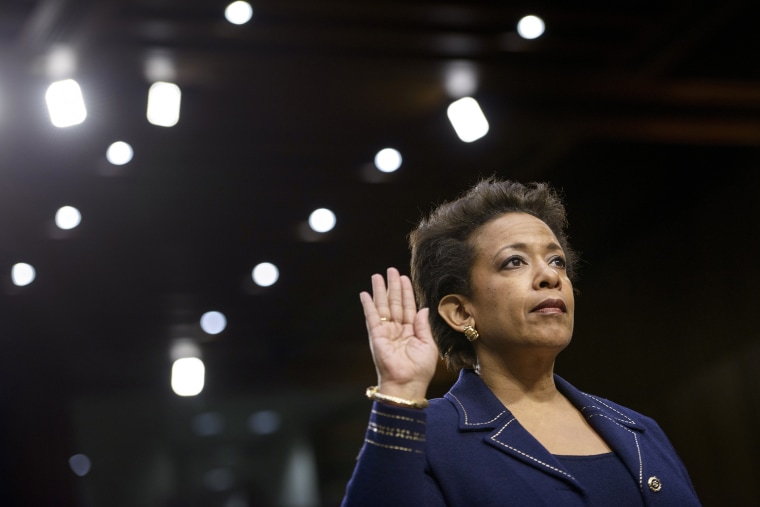Senate Majority Leader Mitch McConnell (R-Ky.) vowed last week that the delay over Loretta Lynch's Attorney General nomination would soon end, but his promise lacked specificity. The Republican leader announced Lynch would finally get a vote "next week" -- which is to say, this week -- but for reasons that no one could explain, McConnell wouldn't say which day, exactly.
Yesterday, the GOP strategy became clearer. McConnell seems to have kept things vague because he intended to break his word.
Senate Majority Leader Mitch McConnell says there'll be no vote to confirm Loretta Lynch as attorney general until Republicans and Democrats resolve a dispute over a human trafficking bill. "If they want to have time to turn to the attorney general," then "we have to finish the human trafficking bill," McConnell said Sunday on CNN's "State of the Union."
The Majority Leader added that he "had hoped" to allow the Senate to vote on Lynch, whose nomination has, by most measures, already waited longer than any other A.G. nomination in American history, but Lynch "will be put off again" unless Democrats agree to pass the human-trafficking bill that stalled last week.
McConnell went on to say, "We have to finish the human trafficking bill. The Loretta Lynch nomination comes next."
Just so we're clear, there's no procedural concern or rule that must be followed. McConnell could bring Lynch's 128-day wait to an end this morning, and by all appearances, she'd have the votes necessary to be confirmed.
But McConnell doesn't want to. Rather, he prefers to stick to the ransom-based model of governing that he and his party have grown overly fond of.
Stepping back, it's important to remember that the Kentucky Republican, as his tenure as Majority Leader was just getting underway, vowed that the chamber would run more effectively and efficiently under his leadership. He saw the Senate as having lost its way in recent years and Mitch McConnell was the man who could finally put things right.
Two months later, he won't even let members vote on a qualified A.G. nominee unless Democrats meet his unrelated demands -- despite McConnell's promise to the contrary last week.
And what of the human-trafficking bill? That was a bipartisan proposal, set to clear the chamber 100 to 0, but Republicans quietly added an anti-abortion provision and neglected to mention it to the Democratic co-sponsors. Dems, feeling betrayed and opposing the add-on, have decided to withdraw their support for the bill until the GOP majority takes the provision out.
Republicans, of course, refuse to do that -- and now McConnell is connecting all of this to Lynch's nomination, effectively telling Democrats that the A.G. nominee will remain in limbo indefinitely unless they accept the bill, as is.
Or put another way, the Senate is descending into a chaotic circus, in part because Republicans betrayed Democrats (sneaking anti-abortion language into a bipartisan bill), and in part because Republicans betrayed Democrats again (promising to bring Lynch up for a vote and then going back on their word).
Behold, the new-and-improved Senate in all its glory.
Whether the Majority Leader appreciates this or not, there's a real risk associated with broken promises. Obviously, he and his Democratic colleagues aren't going to see eye to eye on policy, but once he develops a reputation as someone who promises one thing and does another, the damage to his credibility may be permanent.
